
Journal of Cotton Science
Scope & Guideline
Fostering Collaboration for Cotton Excellence
Introduction
Aims and Scopes
- Breeding and Genetics:
This area emphasizes the development of new cotton cultivars, genetic diversity, and resistance to pests and diseases. It includes research on breeding methods, genetic markers, and the evaluation of germplasm. - Agronomy and Soils:
Research in this scope addresses the impact of various agronomic practices on cotton yield and quality. It covers soil management, nutrient application, irrigation practices, and environmental factors affecting cotton growth. - Pest Management and Ecology:
This focus area investigates the management of arthropod pests and diseases affecting cotton. It includes studies on insect resistance, the efficacy of insecticides, and integrated pest management strategies. - Engineering and Ginning:
This scope involves research on the technological aspects of cotton processing, including ginning efficiency, equipment design, and the implementation of innovative practices to enhance cotton quality and reduce contamination. - Fabric and Textile Applications:
Research in this area explores the processing of cotton fibers into textiles, including studies on fiber properties, treatments for enhancing fabric performance, and the development of sustainable textile applications.
Trending and Emerging
- Sustainable Practices and Environmental Impact:
There is a noticeable increase in research focusing on sustainable agricultural practices, including reduced pesticide use, cover cropping, and environmentally friendly farming techniques. This trend is vital as it aligns with global sustainability goals. - Technological Innovations in Cotton Management:
The use of advanced technologies such as UAVs (drones) for monitoring crop health and precision agriculture is on the rise. This reflects a broader trend in agriculture towards data-driven decision-making and enhanced productivity. - Health and Quality of Cotton Products:
An emerging focus is on the health benefits and quality aspects of cotton-based products, including antibacterial treatments and fiber quality improvements. This aligns with consumer demands for higher quality and functional textiles. - Resistance to Pests and Pathogens:
Research on developing resistant cotton cultivars to combat pests and diseases is gaining momentum. This focus is essential as pest resistance becomes a critical issue in cotton production due to increased pest pressures.
Declining or Waning
- Traditional Pest Control Methods:
Research on conventional insecticide applications is becoming less prevalent as integrated pest management (IPM) strategies gain prominence. The shift towards sustainable practices may lead to a decline in studies focusing solely on traditional chemical approaches. - Historical Perspectives on Cotton Breeding:
While historical analyses provided valuable insights, the trend indicates a waning interest in retrospective studies. Researchers are increasingly focused on contemporary issues and future directions rather than historical context. - General Agronomy Studies Without Specific Focus:
Broad agronomic studies that do not target specific issues or innovations in cotton production are decreasing. The journal seems to favor research with clear implications for practice and advancements in cotton science.
Similar Journals

Journal of Oil Palm Research
Connecting Researchers and Practitioners in Oil Palm DevelopmentJournal of Oil Palm Research is a pivotal publication in the field of agricultural science, specifically focusing on the multifaceted aspects of oil palm cultivation, research advancements, and sustainability practices. Published by the MALAYSIAN PALM OIL BOARD, this journal serves as a significant platform for disseminating high-quality research and innovative solutions in oil palm agronomy, genetics, and socio-economic impacts, capturing the interest of researchers, industry professionals, and students alike. With an E-ISSN of 2811-4701, the journal is committed to presenting peer-reviewed articles that aim to enhance the understanding of oil palm's role in global agriculture and its contributions to environmental sustainability. The absence of a traditional access fee underscores its dedication to open access principles, fostering broader dissemination of knowledge. As the oil palm industry continues to evolve amidst environmental and market challenges, the Journal of Oil Palm Research remains essential for those dedicated to this field, offering insights that inform practice and policy.

Agrosystems Geosciences & Environment
Exploring innovative solutions for a sustainable future.Agrosystems Geosciences & Environment, published by WILEY, is a premier open access journal dedicated to advancing the interdisciplinary field of agricultural and environmental sciences. With an E-ISSN of 2639-6696, the journal has gained recognition since its inception in 2018, currently holding a Q2 ranking in Agricultural and Biological Sciences, Plant Science, and Soil Science. Operating from the United Kingdom, Agrosystems Geosciences & Environment contributes significantly to knowledge generation and dissemination, offering vital insights into sustainable practices, soil management, and crop optimization. Researchers and professionals will find the open access model particularly advantageous, promoting greater visibility and engagement within the scientific community. By bridging the gap between geosciences and agrosystem management, this journal is vital for those committed to addressing today's critical environmental challenges.
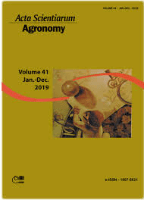
ACTA SCIENTIARUM-AGRONOMY
Pioneering insights that cultivate global agricultural progress.ACTA SCIENTIARUM-AGRONOMY is a prestigious, peer-reviewed journal published by UNIV ESTADUAL MARINGA, PRO-REITORIA PESQUISA POS-GRADUACAO, focusing on advanced research in the field of agronomy and crop science. Since its inception as an Open Access journal in 2007, it has significantly contributed to disseminating high-quality research, allowing unrestricted access to its content for a global audience. Operating from Brazil, the journal holds a notable Q2 category ranking in Agronomy and Crop Science as of 2023, validating its importance within the academic community. The journal’s Scopus ranking positions it in the 49th percentile among Agricultural and Biological Sciences, indicating a robust foundation for impactful research. With a commitment to innovation and scientific excellence, ACTA SCIENTIARUM-AGRONOMY aims to provide researchers, professionals, and students with vital insights that drive forward our understanding of agriculture and its environmental implications.
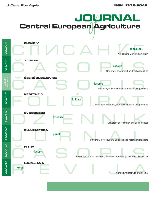
Journal of Central European Agriculture
Sharing Critical Research for a Thriving Agricultural CommunityThe Journal of Central European Agriculture, with ISSN 1332-9049 and E-ISSN 1332-9049, is an esteemed platform published by UNIV ZAGREB, FAC AGRICULTURE that caters to the dynamic fields of agronomy, crop science, and animal science. Since its establishment in 2000, this Open Access journal has played a crucial role in disseminating critical research findings while fostering collaboration among academics, researchers, and professionals within the agricultural community. The journal, which is based in the heart of Croatia, spans a rich history of scholarship, with its content available for free to readers and contributors alike. As reflected in its current standings, the journal has achieved a Quartile 3 ranking in Agronomy and Crop Science and Quartile 4 in Animal Science and Zoology for the year 2023, indicating its growing influence within these disciplines. With Scopus ranks placing it in the 32nd percentile among its peers, the Journal of Central European Agriculture is committed to advancing agricultural sciences not only in Central Europe but globally as it prepares for its converged years from 2007 through 2024. This journal serves as a vital resource for innovative research, practical applications, and a deeper understanding of agricultural challenges and solutions.

Egyptian Journal of Agronomy
Fostering Growth in Agricultural Research and InnovationEgyptian Journal of Agronomy, published by the NATL INFORMATION DOCUMENTATION CENT, ACAD SCIENTIFIC RESEARCH & TECHNOLOGY, serves as a pivotal platform for researchers, professionals, and students focusing on various disciplines within the agricultural sciences, including agronomy, soil science, horticulture, and ecology. With an ISSN of 0379-3575 and E-ISSN of 2357-0288, the journal aims to bridge the gap in knowledge and innovation in the field with its comprehensive studies and frameworks. While the journal is currently categorized in low Scopus ranks, indicating immense potential for growth in influence and impact, it remains dedicated to providing quality research and fostering advancements in agronomic practices. Set in Egypt, a hub for agricultural research, the journal is committed to reflecting the regional and global challenges in agriculture. The Egyptian Journal of Agronomy is a vital resource for anyone engaged in the evolving landscape of agricultural science, offering insights that promote sustainable practices and address current issues facing the sector.
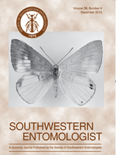
SOUTHWESTERN ENTOMOLOGIST
Fostering Collaboration in Insect Research and EcologySOUTHWESTERN ENTOMOLOGIST is a pivotal academic journal dedicated to advancing the fields of Agronomy, Ecology, and Insect Science. Published by the SOUTHWESTERN ENTOMOLOGICAL SOC in the United States, this journal plays a crucial role in disseminating vital research findings that address pressing ecological and agricultural challenges. With its ISSN 0147-1724 and E-ISSN 2162-2647, the journal has been publishing comprehensive studies since 1993 and continues to contribute significantly to the knowledge base up to 2024. As a Q4 ranked journal in both Agronomy and Crop Science and Ecology, as well as Insect Science, it provides an inclusive platform for researchers and students to share their insights and foster collaborations. Although it currently does not offer open access options, the content is accessible to academic institutions and professionals, ensuring that significant findings reach a broad audience. Given its niche focus, SOUTHWESTERN ENTOMOLOGIST not only appeals to researchers and students but also to professionals looking to stay updated on the latest trends and developments in entomology and its related fields.
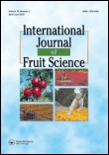
International Journal of Fruit Science
Exploring the future of fruit cultivation and sustainability.International Journal of Fruit Science, published by TAYLOR & FRANCIS INC, is a preeminent platform for the dissemination of high-quality research in the fields of Agronomy, Horticulture, Ecology, and Plant Science. With an impressive track record since its inception in 2005 and ongoing convergence up to 2024, this journal serves as a vital resource for scholars and industry professionals alike. Renowned for its rigorous peer-review process and comprehensive publication of cutting-edge studies, it holds a distinguished position in multiple Scopus rankings, including a top 10 placement in Horticulture (Rank #8/115) and notable percentiles, reflecting its significant impact in the academic community. Researchers can delve into critical insights related to fruit cultivation, genetics, and sustainability, bolstered by its Q1 and Q2 quartile standings across various categories. Though the journal is not open access, it remains an essential read for those intent on advancing knowledge and practices within the rapidly evolving landscape of fruit science.
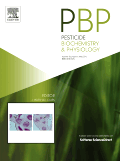
Pesticide Biochemistry and Physiology
Illuminating the toxicological effects of pesticides for informed practices.Pesticide Biochemistry and Physiology, published by Academic Press Inc Elsevier Science, is a prominent peer-reviewed journal dedicated to advancing knowledge in the fields of agronomy, crop science, and the toxicological effects of pesticides. With an established history since 1971, this journal aims to provide a platform for researchers and professionals to share groundbreaking studies that bridge the gap between agricultural practices and environmental health. Holding a remarkable Q1 ranking in both Agronomy and Crop Science as well as Health, Toxicology, and Mutagenesis, it reflects the journal's commitment to high-quality research. The journal is essential reading for anyone involved in the sustainability of agricultural ecosystems, offering insights into the biochemical interactions of pesticides and their physiological impacts on various crops and non-target organisms. As the global demand for sustainable agricultural practices escalates, Pesticide Biochemistry and Physiology remains at the forefront, promoting innovative research to ensure both food security and environmental safety. Converged through an extensive range of studies, this journal is a valuable resource for researchers, professionals, and students aiming to make significant contributions to the evolving landscape of pesticide biochemistry.
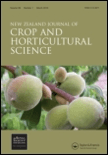
NEW ZEALAND JOURNAL OF CROP AND HORTICULTURAL SCIENCE
Transforming Agriculture with Cutting-edge ResearchThe New Zealand Journal of Crop and Horticultural Science, published by Taylor & Francis Ltd, stands as a key resource in the fields of Agronomy and Horticulture, with a commendable impact factor reflecting its quality and influence in the scientific community. Since its inception in 1989, this journal has been committed to advancing our understanding of crop development and horticultural practices, catering not only to researchers and professionals but also to students eager to delve into the intricacies of plant sciences. With a Q3 ranking in both Agronomy and Crop Science and Horticulture as of 2023, the journal occupies a significant position within the agricultural and biological sciences domain, significantly contributing to the body of knowledge in these fields. The journal features original research, reviews, and technical notes that cover a wide range of topics, ensuring a comprehensive perspective on contemporary and emerging agricultural issues. For individuals interested in accessing cutting-edge research, the journal provides subscription-based access, further enhancing its scholarly contributions.
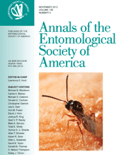
ANNALS OF THE ENTOMOLOGICAL SOCIETY OF AMERICA
Advancing the Frontiers of Insect ScienceANNALS OF THE ENTOMOLOGICAL SOCIETY OF AMERICA is a premier journal dedicated to advancing the field of insect science, published by Oxford University Press. With an impressive impact factor and classified in the Q1 quartile for its category, this journal ranks among the top publications in agricultural and biological sciences, specifically within insect science, positioned at #28 out of 181, indicating its significant influence and high-quality research contributions. The journal aims to disseminate original research, comprehensive reviews, and groundbreaking findings that enhance our understanding of entomology, spanning across ecological, evolutionary, and applied segments. With a consistent publication history since 1938, researchers, professionals, and students will benefit from the wealth of knowledge presented in its pages. Although the journal does not currently offer open access, it remains a vital resource for those seeking to stay at the forefront of entomological research and innovation.